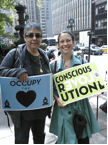Susan Naomi Bernstein (left) is a writer and educator living in Queens, NY. She also writes the blog Beyond the Basics (for Bedford Bits)
We speak of the “war on women” in the United States as if inequality for women was a new and disconcerting phenomenon, peculiar to the 21st century and confined only to our current political context. Yet we ignore the last century of our gains and our losses in United States history at great peril. As we pay attention to history, we see inequality is not new and that war, with its emphasis on the binaries of right and wrong and its outcomes of irreconcilable human death and anti-humanitarian destruction, offers an unhelpful analogy for the new world we wish to create. We have turned against each other often as we attempt to track our progress in waves of women’s movement, old against young—who has suffered more, who has sacrificed less, who has become more of a disappointment or less of a burden.
Rather than share our resources as women we have often been at terrible odds with each other—divided by race, class, perceived ability, sexual orientation, age, and other apparent markers of difference. We have succumbed as much to our own prejudices as we have been targeted by the prejudices of others. We have ignored our own power and abused that power to inflict suffering on others. We have failed to use power for the greater good, and have become lost in claiming power for our own person gain. Instead we must look back to history for moments when we worked together for changes that became larger than ourselves. We also must understand our place in shaping the future, of creating history that from which others may benefit in years to come. The ends of our struggle do not justify the anger and hatred embedded in our means, no matter how righteous that anger may feel in the existential moment.
As we consider legal and social barriers to women’s full humanity, we can see that our struggles remain ongoing. In the last century of United States history alone, we have experienced: the suffragette movement for a constitutional amendment for women’s right to vote (finally ratified in 1920); our entry into and then exile from the workplace as World War II began and ended (1940s-1950s); our liberation from forced pregnancy through access to legal birth control and abortion (1960s-1970s); our failure to gain an equal rights amendment to our constitution for equal protection under the law, and the entry of greater numbers of middle class women into the paid workforce (1970s-1980s). We have gained rights through scorn and derision (women’s inclusion in the Civil Rights Act of 1964) and through continual challenge (the Title 9 Act of 1972 for legal protection in public educational institutions). Perhaps these struggles were enacted before many of us were born or even conscious of our own roles in creating and enacting history. Indeed as much as we enjoy the fruits of history, we remain profoundly interconnected to the labors of history. When we turn against each other—and as we return to metaphors of war, we stand to lose our understanding of deeper contexts.
Yet the deeper contexts allow us to hold hope for the future. As the Occupy movement reminds us, compassion for one another will move us forward. As we remember our connections to one another—and the interconnections of our histories and our futures—we become mindful of possible roads to social transformation. Our actions and our words hold precious resources for creating a world without war and without fear of war. Let us begin again to sow the seeds of our future by finding our strength and our love in each other as we work together to enact a more peaceable and equitable future for us all.
















